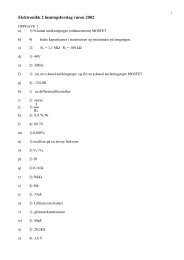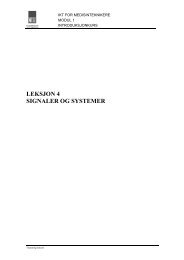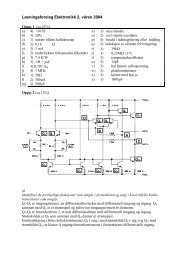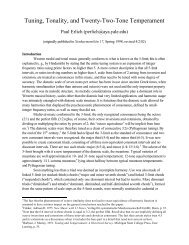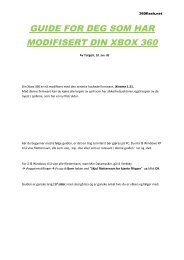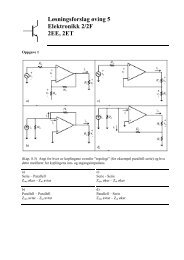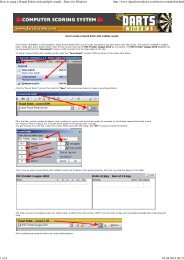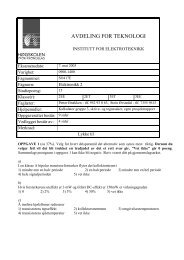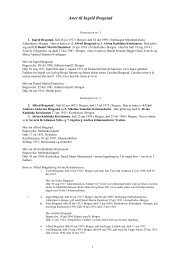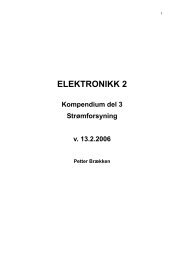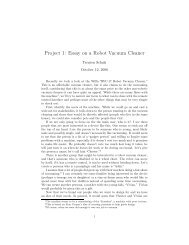The Online World resources handbook
The Online World resources handbook
The Online World resources handbook
Create successful ePaper yourself
Turn your PDF publications into a flip-book with our unique Google optimized e-Paper software.
Electronic mail, telex, and fax http://home.eunet.no/~presno/bok/7.html<br />
you in the process.<br />
Privacy<br />
<strong>The</strong> level of online privacy differs by network, service, and application. Whatever a<br />
service may claim, always expect that someone, somewhere, can watch, even record.<br />
All mailbox services have at least one person authorized to access your personal<br />
mailbox in case of an emergency. Most of the time, they do not have a right to read your<br />
mail without your permission, but they can.<br />
In some countries, mailbox services may let outsiders (like the police) routinely<br />
read your private email to check for 'illegal' contents. Here, email is not safer than<br />
ordinary mail.<br />
<strong>The</strong> good news is that most 'inspectors' and 'sysops' are good, honest people. On the<br />
other hand, it is useful to know the situation.<br />
It is not safe to send sensitive information (like credit card details) by private<br />
electronic mail. True, the chance of an outsider getting hold of and take advantage of<br />
such information is very small, but it is not safe.<br />
On the Internet, it is child's play for someone to intercept your mail. <strong>The</strong> typical<br />
email message travels through many computers. At each computer, people may access<br />
your personal and business correspondence.<br />
On the other hand, with so much mail traveling the network, it is highly unlikely<br />
that they will, but they can.<br />
Encrypt your email to protect sensitive information. Encryption will also<br />
guarantee the identity of the sender of a message, a most useful attribute<br />
when financial transactions are involved.<br />
<strong>The</strong> PGP (Pretty Good Privacy) software has become the Internet standard for<br />
encryption of email and files so snoops cannot read them. For more information on<br />
encryption, check<br />
http://world.std.com/~franl<br />
http://www.isoc.org/internet/issues/encrypton/<br />
http://www.chem.swin.edu.au/~graeme/pgp.html<br />
Sometimes, we need to be certain that a message was written by the sender quoted in the<br />
mail's message header. As it is child's play to send an Internet message carrying other<br />
people's return email address, and name, you may want to use PGP to make sure the<br />
correspondence is authentic.<br />
For this reason, be very skeptical if you ever get a message purportedly from your<br />
Internet access provider telling you to change your password to "k00l/d00d!"<br />
One simple trick to check if correspondence is authentic: If in doubt, investigate the mailer<br />
header. It shows step by step how an incoming mail has travelled through the net, with a time<br />
stamp at each level. If it seems to come from somewhere else, be sceptical. You will not be<br />
able to track all jokers in this way, just the more obious cases.<br />
Privacy is also a concern when talking in the open. Always assume that someone is<br />
recording all that is being said in online conferences, chats, and other interactive social<br />
gatherings. In chats, anyone using a personal computer as a terminal can log the<br />
conversation, or use screen dump to capture 'interesting parts'.<br />
Many PC users can scroll back the screen. <strong>The</strong>y can wait and decide whether to<br />
save the conversation in a file until after the conversation has taken place. With these<br />
capabilities widely available, users of chats and talk should always assume that their<br />
conversations are being recorded.<br />
Do not say indiscreet things in small, informal discussions. Others may record and<br />
repost it under embarrassing circumstances. An unauthorized forward of your private<br />
correspondence is extremely easy, and completely outside your control!<br />
Some people routinely use anonymous remailers when sending email to Usenet<br />
newsgroups or persons to make sure that the recipient (and snoops) cannot tell their real<br />
name or email address. Personally, I never use these services, but note that some do.<br />
10 of 20 23.11.2009 15:45



